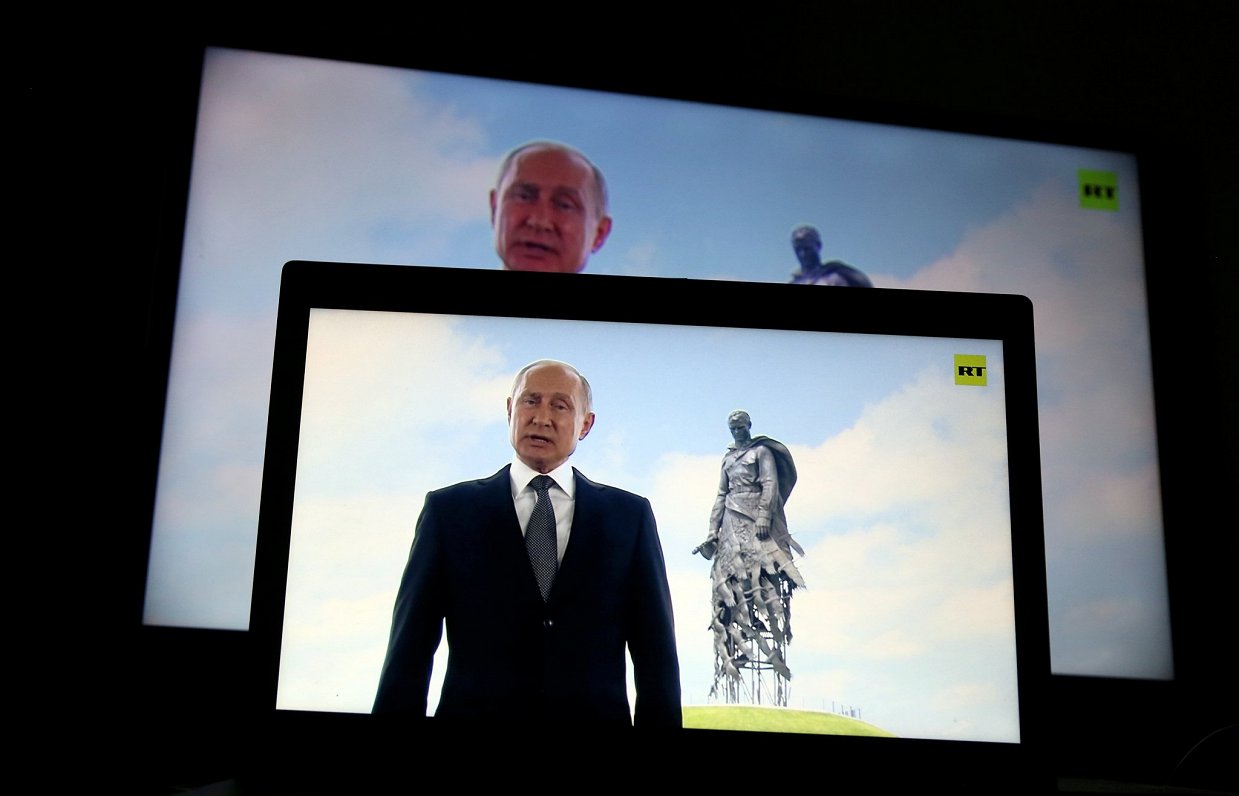Owners of satellite antennas can watch Russian federal propaganda channels for free and cannot be punished for it. There are also numerous illegal ways to watch paid-for channels.
You can buy a satellite antenna easily and quickly. The sellers contacted by Latvian Radio confirmed that their "dishes" will show free Russian TV channels.
"You can probably watch some free channels on the satellites. You either have to figure it out yourself, or you have to contact one of your experts," said a seller.
If you make the effort, even those that are coded and for which you should pay can be viewed. A seller explained: "You have to look for it, you have to put a "box" in, it won't be any different. You have to put a slightly different decoder there." It's not legal, though: "You have to look for private ones. You shouldn't watch Russian channels, they're blocked," said the seller.
Russian state propaganda television channels such as RTR, Russia 24, NTV and First Channel have been banned in Latvia since last March, but are still visible. According to Russian law, federal television must be open to the public in Russia.
But their signal is also received in the territory of Latvia, you only need to adjust the antenna correctly. But it is impossible to measure or track exactly what a person is looking at via a satellite dish.
Juris Rencis, the senior expert in broadcasting issues of the state joint-stock company "Elektroniskie Sakari", admitted this.
"Driving around Latvia, you see that the so-called satellite reception dishes are installed. By their orientation, you can more or less understand which satellite it is oriented to and the possible range of programs that a person is watching. One satellite can have various different content: free, paid for. It gives a hint of what might be there. But it will probably be difficult to draw conclusions about the content actually viewed," explained Rencis.
And while you cannot legally subscribe to Russian paid-for channels in Latvia, there are ways to bypass all this, the specialist explained.
"In the case of satellite, an operation or technical solution that is illegal is common. The access system is fooled, a service is bought that fools this restricted access system by simulating the existence of a legal card. It's called card sharing," explained Rencis.
According to the law, a warning or a fine of up to 700 euros can be applied to a natural person for this practice. But this does not apply to people who watch free-to-air Russian channels for their personal needs. This was explained by Ieva Kalderauska, a member of the National Electronic Media Council (NEPLP), which is the body responsible for banning Russian channels in the first place.
"If a person watches programs via satellite that are freely available, unfortunately also those programs that are prohibited on the territory of Latvia, then this is not a punishable act. In principle, however, this is a person's own conscious choice as to what type of content he watches. And in this sense, there is really no way to limit this type of activity," Kalderauska stated.
However, there have been cases when Russian propaganda television disturbs housemates and neighbors. Last year, the State Police received about 10 such complaints. Vitalijs Polovinskis, the head of the 2nd department of the Department for Combating Economic Crimes, said: "We also receive submissions from law-abiding residents about neighbors and relatives who, by watching banned television programs and expressing support for the Russian Federation's aggression in Ukraine, create divisions in families and society in general."
Last year, six criminal proceedings were initiated for rebroadcasting and providing access to illegal television in Latvia, and 60 administrative offense cases were initiated for the use of illegal systems. In total, 309 illegal devices were seized, as well as information on 90 illegal websites was handed over to NEPLP. Despite the fact that the law now allows the end user to be punished as well, the police still focus on those who distribute illegal content for profit.
Polovinskis explained: "Primarily, the actions of illegal television service providers who provide illegal television services are being investigated, because it is the actions of these persons cause the greatest damage both to the fair business environment and also to the information space."
There is no data available on the number of satellite antennas in Latvia. However, experts estimate that with the banning of Russian channels, the demand for illegal content in Latvia has actually increased.
According to the research of professor Arnis Saukas, which was carried out at the end of 2021 on the order of NEPLP, the volume of the shadow economy in this sector increased to be worth around 32 million euros.
Gunta Līdaka, head of the "For legal content" association, commented on the situation: "This trend shows that part of the audience goes to the shadow economy. And also the practice we see on YouTube, Facebook, where, for example, we can very freely to get the content of the First Russian Channel, including all advertising. I think this is a confirmation that this trend will intensify if we do not look for ways to strengthen our content. Increase the amount of original content, attractive content for Latvians, both in Russian and maybe also in English."
The increase in the amount of illegal television content is planned to be discussed by the Ministry of Culture next week.
























